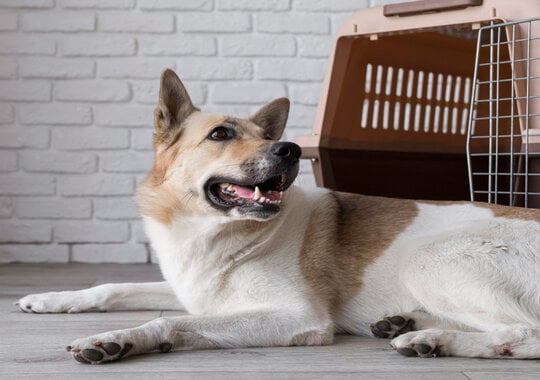What to Give a Constipated Small Dog ( A Must Read) (2024)
Hello, esteemed Pawsitive Tips fans and fellow dog lovers! Would you like to know what to give a constipated small dog? As in the true remedies to help your dog get back to wagging its tail with pleasure. Worry no more! We are going to provide some pro tips in this article that would help solve this problem from the comfort of your home.
So, if you don’t mind, let’s dive right in and discover what to give a small dog that is constipated to bring back the joy in their tummy!
What is constipation in small dogs?
Before we go into what to give a constipated small dog, it is important to understand what constipation is, the causes of constipation in small dogs, and the potential symptoms.
Constipation in small dogs occurs when they have difficulty passing stool, leading to infrequent or strained bowel movements. This condition can vary in severity, from mild discomfort to a more serious issue requiring veterinary attention.
Related articles:
- Here’s why your dog doesn’t eat his food but will eat human food
- Why is my dog pooping during the night? Find out here
- Can dogs eat yellow rice? Find out here
What are the common causes of constipation in small dogs?
Here are some of the most common causes of constipation in small dogs:
- Ingestion of foreign objects: Small dogs are notorious for eating things they shouldn’t, and this can sometimes lead to constipation. If your dog has eaten something that is not easily digestible, such as a bone, a toy, or a piece of fabric, it can get stuck in their intestines and cause a blockage.
- Lack of fiber in the diet: Fiber is very important for keeping the digestive system running smoothly, and when there’s a lack of fiber in your dog’s diet, this can lead to constipation.
- Dehydration: If your dog is not drinking enough water, it can become dehydrated, which can also lead to constipation.
- Lack of exercise: Exercise helps to keep the digestive system moving, so if your dog is not getting enough exercise, it may be more prone to constipation.
- Certain medications: Some medications, such as pain medications and anti-depressants, can cause constipation as a side effect. If your dog is taking any medications, talk to your veterinarian about whether they could be contributing to their constipation.
- Medical conditions: In some cases, constipation can be a sign of an underlying medical condition, such as a tumor, a blockage in the intestines, or kidney disease.
Symptoms of a constipated small dog
If your small dog is constipated, you may notice the following symptoms:
- Difficulty passing stool
- Hard, dry stool
- Painful bowel movements
- Lack of appetite
- Vomiting
- Lethargy
What to give a constipated small dog?
Back to the main question of the day: “What to give a small dog for constipation?” By this, we mean home remedies for constipated small dogs.
To start with, there are a few home remedies that you can try to help your constipated small dog. These include:
- Adding fiber to the diet: Fiber helps bulk up stool and make it easier to pass. You can add fiber to your dog’s diet by feeding them canned pumpkin, psyllium husk, or bran.
- Giving your dog more water: Dehydration can contribute to constipation, so it is important to make sure that your dog is drinking plenty of water.
- Encouraging your dog to exercise: Exercise helps to keep the digestive system moving, so it can help relieve constipation.
- Massaging your dog’s abdomen: Gently massaging your dog’s abdomen can help stimulate the bowels and promote bowel movements.
Related articles:
What medicine can you give a small dog for constipation?
If home remedies do not work, your many veterinarians have recommended the following medications:
The two medications that are commonly prescribed for constipation in dogs are Dulcolax and Metamucil. Dulcolax is a stool softener that helps to relieve dry and hard stools, while Metamucil is a fiber supplement that adds roughage to the dog’s digestive tract, helping to soften the stool and make it easier to pass.
The American Kennel Club (AKC) recommends that Metamucil is safe for constipated small dogs and can prevent dry stools. However, it is important to note that if the dog eats too much fiber, it can cause diarrhea. Therefore, it is important to start with a small dose and increase it gradually as needed.
The AKC also recommends that you not give your dog more than four doses of Dulcolax in a 24-hour period. If your dog is still constipated after taking Dulcolax or Metamucil, it is advised to see your veterinarian. There may be an underlying medical condition that is causing the constipation, and your veterinarian will be able to diagnose and treat the problem. In some cases, surgery may be necessary to remove an intestinal blockage.
Does natural laxatives work for a constipated small dog?
Yes, natural laxatives can work for a constipated small dog. It can make your constipated dog poop faster. Some of the most common natural laxatives for dogs include:
- Pumpkin puree: Pumpkin is a good source of fiber, which can help soften stool and make it easier to pass. You can give your dog 1–4 tablespoons of pumpkin puree per meal.
- Canned dog food: Canned dog food is often higher in moisture than dry food, which can help keep your dog hydrated and prevent constipation.
- Dietary fiber supplements: Dietary fiber supplements can help add bulk to stools and make them easier to pass. You should talk to your veterinarian about the best type of dietary fiber supplement for your dog.
- Olive oil: Olive oil can help lubricate the intestines and make it easier for stool to pass. You can give your dog 1-2 teaspoons of olive oil per day.
- Coconut oil: Coconut oil is another good source of fat, which can help lubricate the intestines and make it easier for stool to pass. You can give your dog 1-2 teaspoons of coconut oil per day.
It is important to note that not all natural laxatives are safe for small dogs. For example, some dogs may be allergic to pumpkin, and others may not tolerate olive oil well. So, it is always best to talk to your veterinarian before giving your dog any natural laxatives.
Frequently Asked Questions
Can milk help dogs with constipation?
Please, when you are looking for what to give a constipated small dog, milk is not a good remedy for dog constipation. In fact, it can actually make the problem worse. Milk can cause diarrhea in dogs, which can lead to dehydration and electrolyte imbalance. It can also cause bloating and gas, which can make it even more difficult for a dog to pass stool.
Do eggs help dogs with constipation?
Eggs can help dogs with constipation, but they are not a cure-all. Eggs are a good source of protein and fat, both of which can help soften stool and make it easier to pass. The shell of an egg also contains calcium, which can help regulate bowel movements.
Final Thoughts
So, there you have it! These are some of the things you can give your constipated small dog to help relieve the problem. It’s important to remember that not all dogs will respond to the same remedies, so it’s best to start with a small amount and see how your dog reacts. If your dog’s constipation does not improve with home treatment, or if it is severe, you should take your dog to the veterinarian.



